-
About
- About Listly
- Community & Support
- Howto
- Chrome Extension
- Bookmarklet
- WordPress Plugin
- Listly Premium
- Privacy
- Terms
- DMCA Copyright
- © 2010-2025 Boomy Labs

Listly by tpowers
Music education develops the brain, give social skills and trains for success.
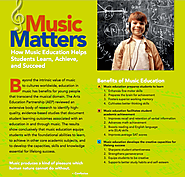
Music Education prepares the learner, facilitates achievement and develops creativity

Early childhood music training can lead to improvements in both musical skills and language skills, according to Dr Sean Hutchins at the Royal Conservatory of Music in Toronto, Canada. Dr Hutchins is the director of research at the Conservatory and is commenting on the results of the first year of data from a longitudinal study…
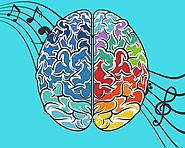
The first large-scale, longitudinal study in the Netherlands, finds that structured music lessons significantly enhance children's cognitive abilities and academic achievement.

The ability to synchronise with a beat could indicate how well children of pre-school age will develop their future reading skills.

The relationship between musical training and speech perception has intrigued researchers in language and music for decades, from Bever and Chiarello’s (1974) work emphasizing hemispheric specialization to Tallal and Gaab’s (2006) findings of shared neural circuitry. Recent studies demonstrating neural overlap for processing speech and music, and enhanced speech perception and production in musicians, suggest that these regions may be inextricably intertwined (Sammler et al., 2007; Wong et al., 2007; Rogalsky et al., 2011; Schulze et al., 2011). Patel’s (2011) OPERA hypothesis and Hickok and Poeppel’s (2000, 2007) neuroanatomical models continue to evolve and guide this field of research. However, the extent of neural overlap between music and speech remains hotly debated (Norman-Haignere et al., 2015; Peretz et al., 2015), with surprisingly little empirical research exploring specific neural homologs and analogs. Emerging evidence suggests that shared processes likely exist throughout development, depend upon an individual’s acoustic experiences, and are affected by developmental trajectories. Moreover, developing theories that address the neural and developmental interaction between music and language processing in conjunction with the broad availability of sophisticated tools for quantifying brain activity and dynamics offer the perfect opportunity for researchers to address these key empirical questions. Taken together, this field of research has begun to elucidate ...
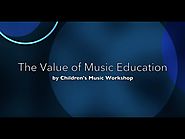
This 4m video by the Children's Music Workshop in Los Angeles, California, presents a powerful argument for the inclusion of music in the school curriculum of children and young people.
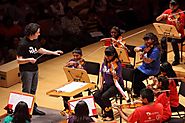
Two new studies from the Brain and Creativity Institute at USC show that as little as two years of music instruction has multiple benefits. Music training can change both the structure of the brain’s white matter, which carries signals through the brain, and gray matter, which contains most of the brain’s neurons that are active in processing information. Music instruction also boosts engagement of brain networks that are responsible for decision-making and the ability to focus attention and inhibit impulses.

Several brain regions engage in an amazing symphony to produce music. What then are the benefits of music training on a child?

New research from Canada finds trained musicians more efficiently switch from one mental task to another.

A Bradford primary school wants the world to know its newfound Sats success is down to giving all children up to six hours of music a week
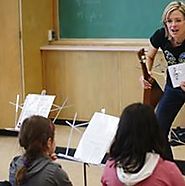
Can group musical training produce more sympathetic, kinder and socially adept children? The latest study out of Professor Glenn Schellenberg’s lab in the Department of Psychology at U of T Mississauga certainly suggests this to be the case.

How do shared music experiences influence social behavior? Could music be
used as a method for increasing the quality of interaction, help
individuals understand each other’s feelings and share a heightened sense
of connectedness? In recent years, studies showing positive effects of
music on social behavior have began accumulating.
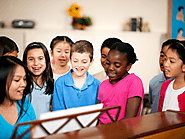
How music can aid social and emotional development

With so much pressure on schools to improve test scores, music and the arts sometimes fall off the list of priorities. That's led advocates for music education to point out its benefits in the classroom.

Research shows that learning the do-re-mis can help children excel in ways beyond the basic ABCs. Learn all the benefits of music education.
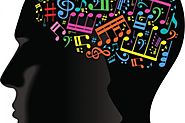
Read about important benefits of music and how music education offers benefits even beyond itself. And learn how you can support music in our schools.
Benefits of Music Education base on Neuroscience Research

"One of the biggest kicks is to see a child come into the music program as an introvert and leave as a student leader. That's a tremendous process." - Dick Zentner, 2013 Patrick John Hughes Parent/Booster Award Recipient
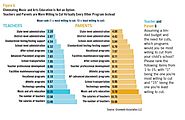
A new survey of parents and teachers shows how strongly they feel about music education and I pull out some of the more interesting points.
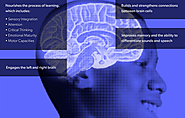
Students in high-quality school music education programs score higher on standardized tests compared to students in schools with deficient music education programs, regardless of the socioeconomic level of community.
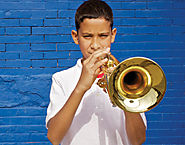
Jay thought he would have to wait until High School to play an instrument. Much to his surprise, his elementary school received a Save The Music grant in 2015. Now in 9th grade, he says “music helped bring out my inner talent.” Meet Jay

“Andre’ was very excited that we were finally going to have a school band. I told him to focus on his grades and we would talk in December to see how he was progressing. Not only had his grades improved in every subject, but Andre’ even had an ‘A’ in Language Arts, one of the subjects he had been struggling with the most. The next day, I was honored to assign him the trumpet he had been desperately wanting to play all year long. He told me thank you, and thanked me for believing in him. As we worked on learning music for our school Mardi Gras parade, I couldn’t help but smile as I watched Andre’ play his trumpet with such pride and passion. Music matters and has clearly made a difference with him.”
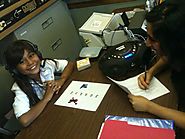
In talking about the need for a well-rounded education, Secretary Duncan has consistently invoked the importance of keeping arts in the mix. Over the past three years, researchers at Northwestern University have teamed up with the Harmony Project, a nonprofit instrumental music program based in Los Angeles, as well as public charter schools in Chicago, to investigate just how important the arts are to learning.

Music educator Richard Gill argues the case for igniting the imagination through music and for making our own music. In this talk, he leads the TEDxSydney au...
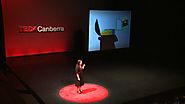
This talk was given at a local TEDx event, produced independently of the TED Conferences. Anita Collins shares how learning music influences our brain develo...